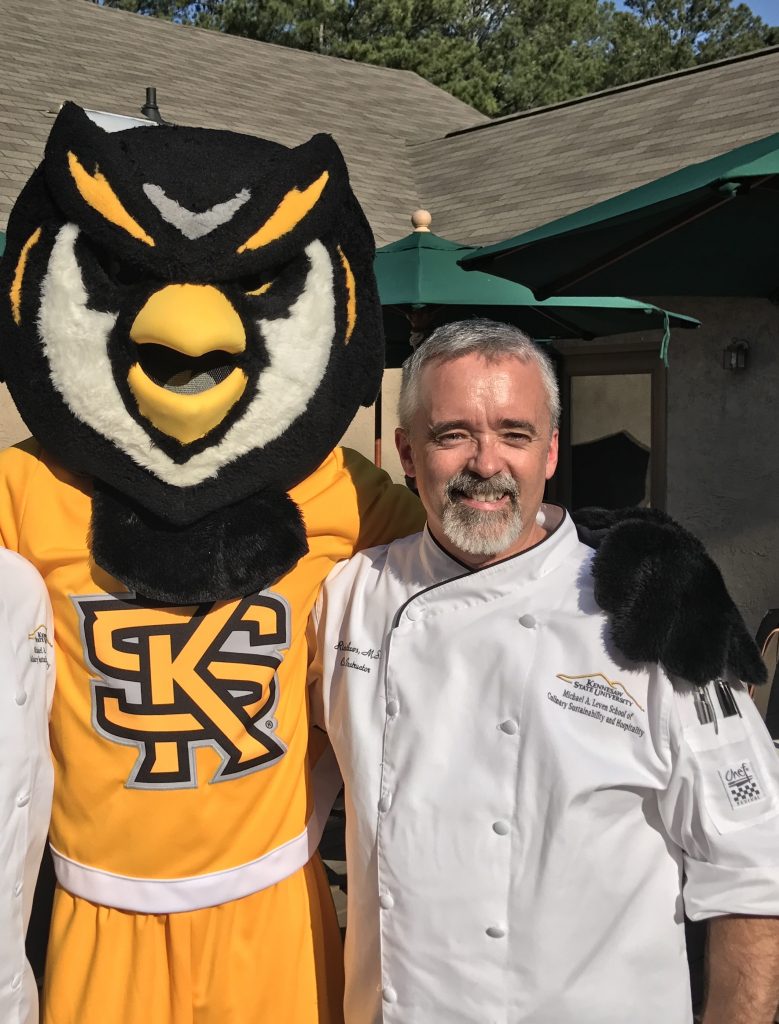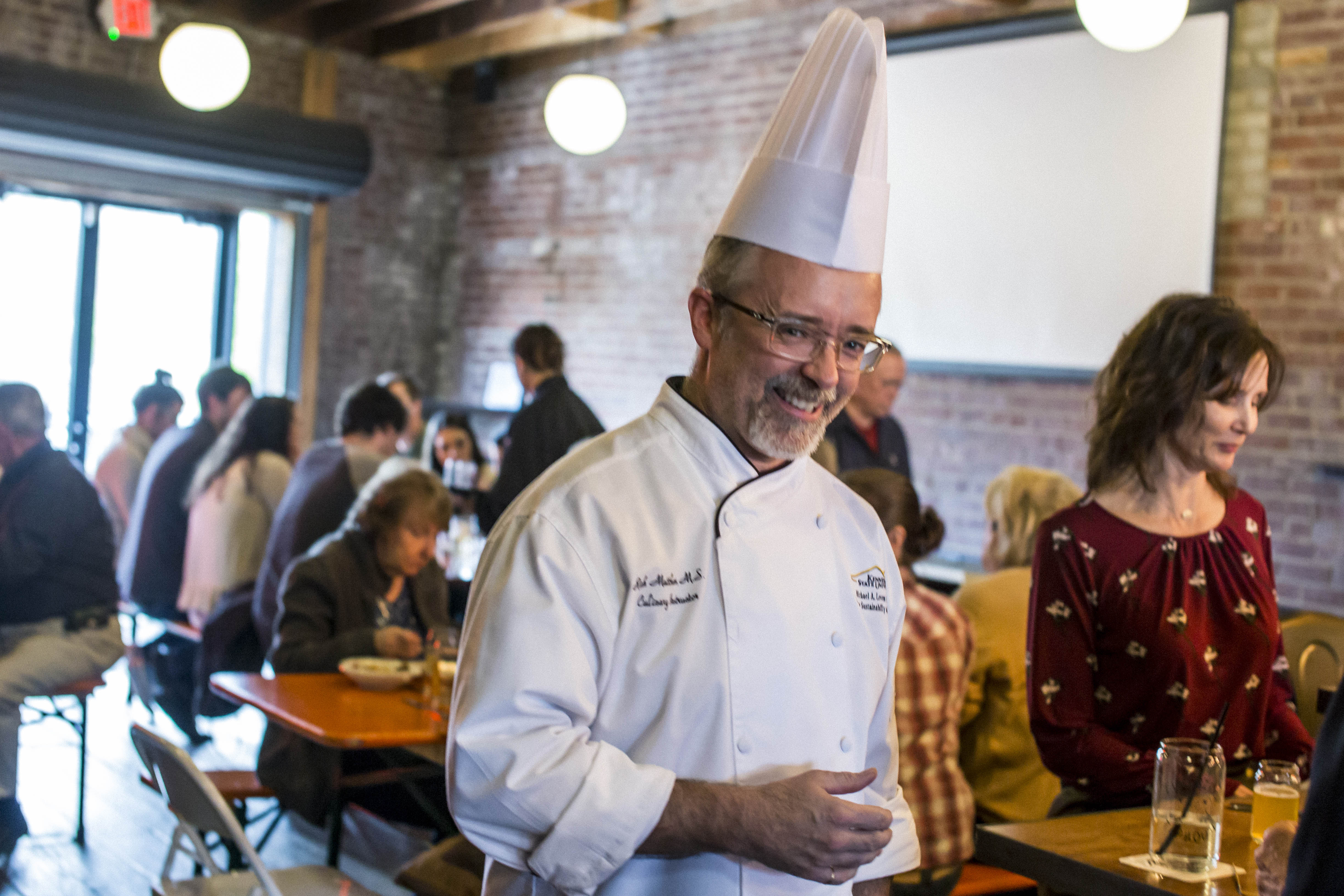Instructor Spotlight: Introducing Chef Rich Matthews
The College of Graduate and Professional Education (CGPE) is excited to introduce Chef Rich Matthews, our new instructor for the Culinary Apprenticeship Certificate. Rich brings extensive experience to the program, including student instruction, restaurant management, and designing cuisine for thousands of spectators at major events throughout the country. A career changer himself, Rich is uniquely positioned to mentor students who may be entering the culinary world while juggling other career and life responsibilities.
We sat down with Rich to learn more about his background, discover a few fun facts, and hear about his vision for the course, which will now be offered twice a year.
Tell us about your culinary background.
I worked in public administration for 10 years and decided to embark on my version of running off to join the circus and enrolled in the Culinary Institute of America in Hyde Park, New York.
After earning my degree in culinary arts, I gained most of my industry experience working in large hotels. I’ve worked in the Hudson Valley area of New York, Fort Lauderdale, Florida, and even spent six months cooking in England. I’ve served as a sous chef at Mohonk Mountain House and Bahia Mar Beach Resort where I prepared cuisine for large banquets and a la carte dinner service while managing all aspects of kitchen operation.
My experience as an instructor began when the director of the culinary program at the Art Institute of Fort Lauderdale introduced himself to me while I was working a buffet. That introduction led to a chef instructor position as well as an opportunity to manage a student-operated a la carte restaurant. Since that time, I’ve served as full-time culinary arts instructor for about 10 years as well as an adjunct instructor and lecturer for other foodservice and hospitality management programs. I have taught everything from fundamental to advanced cooking techniques, hospitality management courses, the ServSafe Manager®certification, and job skills development.
Why did you decide to become a chef?
When I was working in public administration, I had a good job, compensation, and standing in the community, but I was looking for something more satisfying. Friends encouraged me to do a week-long intensive at the Culinary Institute of America, which is the original culinary arts school in the United States. After that experience, I decided to take the plunge. I rented a basement apartment and enrolled full-time in their two-year program. Making a career change helps me relate to students who are already established in their careers and are looking to do the same.
What are some of your favorite jobs and culinary experiences?
The first experience that comes to mind is when I was an instructor at the Art Institute of Fort Lauderdale and took a group of students to work as a team at the Kentucky Derby. We spent a week in a mobile kitchen that was set up in the parking lot to serve thousands of guests. It was an incredible cooking experience, and we were finished in time to enjoy the race!
Another memorable experience was serving as the banquet chef at Mohonk Mountain House during the wedding season. Being highly focused on food, weddings are very different from corporate and other events. During one wedding where the kitchen and banquet hall were on different floors, a waiter dropped 12 plates and our team had to act quickly to clean up and keep things running smoothly. It’s always an adventure in the kitchen!
I also remember the time a banquet order was passed to the kitchen without any information about the group we’d be serving. As it turned out, the order was for a hungry hockey league that went through the food we prepared in about five minutes! While we had to scramble to keep everyone fed, it was a great opportunity to make decisions and respond to pressure.
What is your favorite cuisine to cook?
The first decision every chef needs to make is whether they will focus on pastries or on savory dishes. I have a hard time saying no to sugar, so I choose to go with savory. I really enjoy preparing braised beef short ribs and lobster risotto.
Why is it important for future chefs to invest in culinary education?
For those who have a passion for food, the program provides the foundation to understand good kitchen safety, knife skills, and cooking techniques. From there, graduates of the program can launch a career anywhere in the world. As part of my own culinary school experience, I had to work a 6-month internship. I could have stayed in the U.S., but I love to travel, so I decided to work in England for six months.
What makes the Culinary Apprenticeship Certificate at KSU the best choice for students?

I think the fact that it meets one night per week and is spread over several months makes this program a great choice, especially for people who have other life commitments. Also, the program features a sampling of all aspects of cuisine, creating a beautifully plated dish, and has a strong emphasis on food safety. We have an excellent student to instructor ratio and internships that give students the opportunity to network, practice what they are learning in the kitchen, and ask questions to verify what they are learning.
There are a lot of ways you can achieve an education in culinary arts, but in some programs, you work with only one chef for a couple of years. You can also start in a restaurant and work your way up, but this route takes longer. Other programs out there are quite a bit more expensive. The Culinary Apprenticeship Certificate at KSU offers an excellent culinary education for a good price.
What dishes will your students learn to cook in the first few weeks?
We will start with food safety and sanitation along with knife skills, then move to soups and sauces. We’ll learn how to make pasta from scratch, then focus on basic cooking methods, such as roasting and sauteing while working with chicken, fish, veal, etc. Each night we will prepare a variety of dishes. As we work toward the end of the program, the techniques become more sophisticated, so everyone has a good grasp of cooking fundamentals. For example, I want our graduates to feel confident that if their chef asks them to sauté a chicken breast, they know the equipment it takes to cook it properly and the right application of heat to get the best results. The only thing they should have to ask is how does the chef want it seasoned.
What special events do you have planned for the program?
In order to be creative, you have to master the basics first. Our capstone project for the program will involve a cooking practical where students will do a blind draw between two or three different dishes that they’ve already seen before and must replicate.
How would you describe your teaching style or philosophy?
My goal is to connect with students and understand their background. I want to challenge, help, and meet each student’s individual learning needs. I like showing how the concepts I’m teaching are relevant to the industry while sharing my own personal experiences and share practical tips they can use in the commercial kitchen as well as at home.
What are you most looking forward to as the Chef instructor for the Culinary Apprenticeship Certificate?
I love watching people demystify something like mayonnaise or learn how to fix a broken sauce like hollandaise. I love to see students learn how to correct mistakes and deconstruct a cooking process to achieve the same result using a different method. Those “ah ha!” break through moments when someone realizes why their stew has always been a little tough or their cookies are flat and crispy when they really want cookies that are thick and chewie.
How can the program best prepare students to work in the culinary industry as it bounces back from COVID-19?
The pandemic did have an impact on local restaurants, but it also brought to light other food service industries that continued and thrived, such as assisted living, hospitals, etc. There are many facets to food service. Culinary professionals are needed wherever people eat. This program can prepare students to work in a variety of arenas.
What should students consider before enrolling in the Culinary Apprenticeship Certificate?
I think it’s important for students to understand that the culinary industry involves physically demanding work. Cooking at home and cooking in the industry are not the same experience.
Many settings require physical resilience as you are on your feet for long periods of time. As a chef, you have to gain satisfaction in preparing food people enjoy with the understanding that you need to be there before people arrive, while they eat, and after they are gone. It can involve nights, weekends, and holidays, depending on which segment of the industry you choose.




